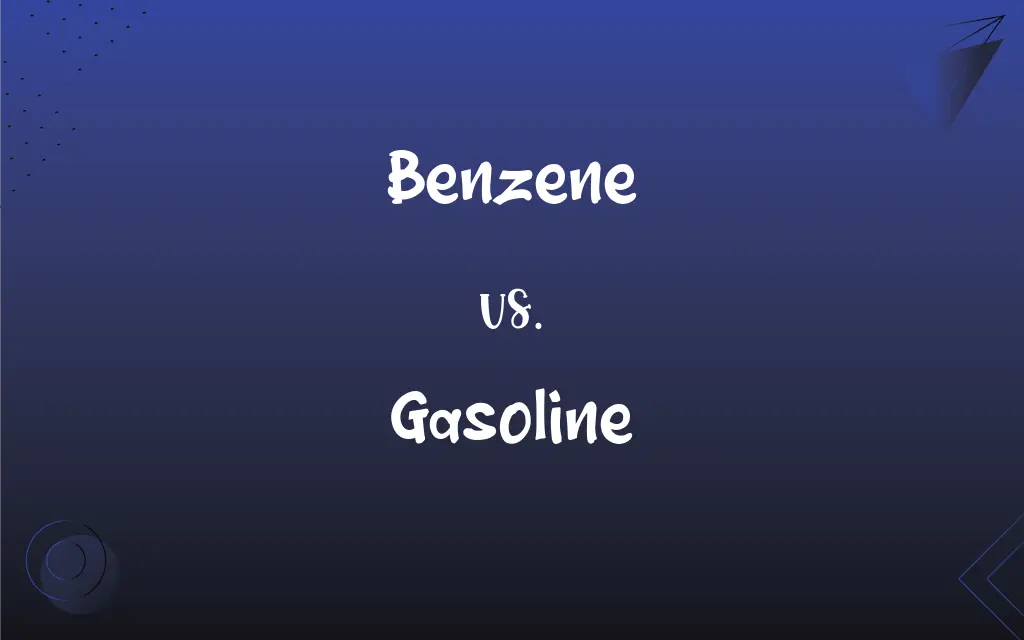Benzene vs. Gasoline: What's the Difference?
Edited by Aimie Carlson || By Janet White || Published on January 21, 2024
Benzene is a volatile, aromatic hydrocarbon often used as an industrial solvent, while gasoline is a complex fuel mixture used in internal combustion engines.

Key Differences
Benzene, a simple aromatic hydrocarbon with a sweet odor, is primarily used in chemical synthesis. Gasoline, on the other hand, is a complex blend of hydrocarbons used as a fuel in vehicles. Both are derived from crude oil but have different applications and properties.
In terms of chemical structure, benzene consists of a six-carbon ring with alternating double bonds, making it a stable yet reactive compound. Gasoline is a variable mixture of different hydrocarbons, including alkanes, cycloalkanes, and in some cases, small amounts of benzene. Each has distinct chemical and physical properties relevant to their use.
Benzene is known for its use in the manufacture of plastics, resins, and synthetic fibers, as well as a solvent in many industrial processes. Gasoline's primary use is as a fuel in internal combustion engines, powering vehicles. Both are essential in their respective sectors.
Regarding health and environmental impacts, benzene is a known carcinogen and requires careful handling and exposure control. Gasoline, while less toxic than benzene, poses environmental concerns, particularly in terms of air pollution and spill risks. Both have significant health and environmental considerations.
In terms of volatility, benzene has a high evaporation rate and is highly flammable, necessitating strict safety measures during handling. Gasoline also has high volatility, which is essential for its use in fueling internal combustion engines, but also makes it a fire hazard.
ADVERTISEMENT
Comparison Chart
Chemical Structure
Simple aromatic hydrocarbon, six-carbon ring
Complex blend of hydrocarbons
Primary Use
Industrial solvent, chemical synthesis
Fuel for internal combustion engines
Toxicity
Known carcinogen, highly toxic
Less toxic but poses environmental concerns
Environmental Impact
Requires careful handling due to carcinogenic nature
Air pollution, spill risks
Volatility and Flammability
Highly volatile and flammable
Highly volatile, essential for engine combustion
ADVERTISEMENT
Benzene and Gasoline Definitions
Benzene
Benzene is a colorless, sweet-smelling chemical compound.
The laboratory used benzene in organic synthesis experiments.
Gasoline
It's derived from the refining of crude oil.
Gasoline is a key product of petroleum refineries.
Benzene
It's used as a precursor in the production of plastics.
Benzene forms the base for many plastic materials.
Gasoline
Gasoline vapors are highly flammable.
Care must be taken to avoid igniting gasoline vapors.
Benzene
Benzene is known for its carcinogenic properties.
Safety protocols are essential when handling benzene due to its toxicity.
Gasoline
Gasoline is a liquid fuel used primarily in vehicles.
The car runs efficiently on unleaded gasoline.
Benzene
It is a natural constituent of crude oil.
Benzene is refined from crude oil in chemical plants.
Gasoline
It's a mixture of various hydrocarbons.
Gasoline's composition varies between brands and types.
Benzene
Benzene has a high rate of evaporation.
Benzene quickly evaporates at room temperature.
Gasoline
Gasoline powers internal combustion engines.
Most automobiles use gasoline to drive their engines.
Benzene
A colorless, flammable, toxic, liquid aromatic hydrocarbon, C6H6, derived from petroleum and used in or to manufacture a wide variety of chemical products, including DDT, detergents, insecticides, and motor fuels. Also called benzol.
Gasoline
A volatile mixture of flammable liquid hydrocarbons derived chiefly from crude petroleum and used principally as a fuel for internal-combustion engines.
Benzene
(organic compound) An aromatic hydrocarbon of formula C6H6 whose structure consists of a ring of alternate single and double bonds.
Gasoline
A flammable liquid consisting of a mixture of refined petroleum hydrocarbons, mainly used as a motor fuel; petrol.
Benzene
Sometimes used in place of the phenyl group.
Gasoline
(countable) Any specific kind of gasoline.
The refinery produces a wide range of gasolines.
Benzene
A volatile, very inflammable liquid, C6H6, contained in the naphtha produced by the destructive distillation of coal, from which it is separated by fractional distillation. The name is sometimes applied also to the impure commercial product or benzole, and also, but rarely, to a similar mixed product of petroleum.
Gasoline
Marijuana, especially very potent or high quality.
Benzene
A colorless liquid hydrocarbon; highly inflammable; carcinogenic; the simplest of the aromatic compounds
Gasoline
(slang) An alcoholic beverage made of vodka and energy drink.
Gasoline
Made from or using gasoline.
Gasoline
A highly volatile mixture of fluid hydrocarbons, obtained mostly from petroleum, as also by the distillation of bituminous coal. It is used as a fuel for most automobiles and for many other vehicles with internal combustion engines. The gasoline of commerce is typically blended with additives to improve its performance in internal combustion engines. Gasoline was also used in the early 1900's in making air gas, and in giving illuminating power to water gas. See Carburetor.
Gasoline
A volatile flammable mixture of hydrocarbons (hexane and heptane and octane etc.) derived from petroleum; used mainly as a fuel in internal-combustion engines
FAQs
Is benzene found in gasoline?
In small amounts, as part of the hydrocarbon blend.
How is benzene used?
In manufacturing plastics, resins, and as a solvent.
What's the primary use of gasoline?
As a fuel for internal combustion engines in vehicles.
What is gasoline?
A fuel made from a blend of hydrocarbons, used in vehicles.
What is benzene?
A volatile aromatic hydrocarbon used in industry and chemical synthesis.
What environmental concerns are associated with benzene?
Its release can contribute to air and water pollution.
What precautions are needed for handling benzene?
Avoid inhalation and skin contact, use proper protective gear.
How should gasoline be stored?
In approved containers, away from heat sources.
How are benzene and gasoline produced?
Both are derived from the refining of crude oil.
Is benzene dangerous?
Yes, it's a carcinogen and highly toxic.
Are there health risks associated with gasoline?
Inhalation of vapors and skin contact can be harmful.
Can benzene be used as a fuel?
It's not typically used as fuel due to its toxicity.
Why is gasoline preferred as a vehicle fuel?
For its energy efficiency and compatibility with engines.
What safety measures are important when refueling with gasoline?
Avoid spills, don't inhale vapors, and shut off the engine.
Is benzene used in everyday products?
It's a component in some plastics, lubricants, and dyes.
What industries rely heavily on benzene?
The chemical, plastic, and pharmaceutical industries.
What's the impact of gasoline on the environment?
It contributes to air pollution and greenhouse gas emissions.
Can gasoline be used in any engine?
It's suitable for most internal combustion engines designed for it.
How does the quality of gasoline vary?
It varies in octane rating, additives, and hydrocarbon composition.
How does benzene affect human health?
Long-term exposure can cause cancer and blood disorders.
About Author
Written by
Janet WhiteJanet White has been an esteemed writer and blogger for Difference Wiki. Holding a Master's degree in Science and Medical Journalism from the prestigious Boston University, she has consistently demonstrated her expertise and passion for her field. When she's not immersed in her work, Janet relishes her time exercising, delving into a good book, and cherishing moments with friends and family.
Edited by
Aimie CarlsonAimie Carlson, holding a master's degree in English literature, is a fervent English language enthusiast. She lends her writing talents to Difference Wiki, a prominent website that specializes in comparisons, offering readers insightful analyses that both captivate and inform.







































































